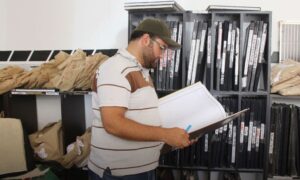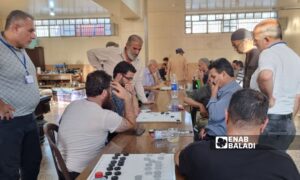
Why does the French judiciary deny justice for Syrians’ suffering?

Enab Baladi – Saleh Malas
The European universal jurisdiction trials related to the non-international armed conflict in Syria demonstrated the need to expand the efforts of holding accountable the perpetrators of war crimes and crimes against humanity among those in power in Damascus. That is because accountability is a permanent pledge that does not fall under the statute of limitations and because justice will be achieved, even if it is insignificant in comparison to the accumulated and often shocking violations.
States exercise jurisdiction over such crimes on the basis of the principle of the offender or the victim’s nationality, or on the principle of extraterritorial universal jurisdiction; this principle enables the prosecution of the offender regardless of his or his victims’ nationality, under certain conditions such as presence or residence in the state in which the litigation occurs.
Syrian refugees have increasingly flocked to EU countries since 2011. Among them were those who inflicted suffering upon others through arrests and torture, which consequently led to these crimes being brought to justice in Europe.
However, litigation proceedings related to crimes committed in Syria were very complicated in France, which hindered the filing of several cases against individuals suspected of committing war crimes or crimes against humanity.
The constriction of interpretation
The decision of the French Court of Cassation of November 2021 limited the jurisdiction of French courts over crimes committed in Syria. The Court of Cassation ruled that local courts were not competent to try a former Syrian intelligence agent for complicity in crimes against humanity.
As illustrated by a handbook on the mechanisms of exercising universal jurisdiction in France that was published by the Syria Justice and Accountability Center (SJAC) in 2019, the application of such jurisdiction in the country is subject to two basic conditions, in case the perpetrator or the victim does not possess French nationality; the first condition is that the suspect is present or resident on French territory.
The second condition requires that the crime in question must be a war crime or a crime against humanity. France is obligated to prosecute the perpetrators of such crimes by an international agreement, i.e., the Rome Statute of the International Criminal Court.
The Court of Cassation reasoned that Syria did not define war crime or crime against humanity in its legislations. The French legal system also excludes from its jurisdiction international crimes committed on or by nationals of all non-member states of the International Criminal Court, including Syria.
This decision raised concerns among Syrian human rights defenders that the future of thousands of Syria-related investigations would be undermined. It is also feared that such a decision could turn France into a “safe haven” for perpetrators of violations in Syria.
Facilitating accountability
The French authorities announced in February the initiation of legislative changes to grant extraterritorial jurisdiction to the country’s courts in cases of core international crimes. This may pave the way for the prosecution of the perpetrators of crimes against humanity during the conflict in Syria.
The French Parliament has also adopted a bill authorizing international judicial cooperation between France and the United Nations International, Impartial and Independent Mechanism that handles Syria. The said bill will be presented to the French Senate following Parliament’s approval.
In an interview with Enab Baladi, the lawyer, and director of the legal office at the Syrian Center for Media and Freedom of Expression, Tariq Hokan, indicated that the bill “does not, in and of itself, constitute an endorsement or expansion of the French judiciary’s jurisdiction to look into grave crimes committed in Syria.”
This is because this jurisdiction “exists, and is stipulated, in the French Criminal Code, along with the conditions for activating this jurisdiction. The most important of these conditions is the presence of the suspect on French territory to start the investigation, unlike German law, for example, which does not require meeting this condition to open an investigation.”
The important aspect of this bill, according to Hokan, is to expand the cooperation and exchange of information and evidence between France and the International, Impartial and Independent Mechanism, “therefore allowing French courts and judicial bodies to transfer the information and evidence at their disposal to the International Mechanism, which was only available in the opposite direction.”
This means that the International Mechanism is entitled to provide the French judiciary with all the information and evidence it has regarding a crime within France’s jurisdiction.
In this sense, the bill could be described as “facilitating accountability for crimes committed in Syria,” according to Hokan, who at the same time stressed that this was “not the desired legislative measure.”
“What we are seeking is the amendment of the French Criminal Code to allow the start of an investigation, even in the absence of a suspect, based on universal jurisdiction,” Hokan recommended. He considered that the most important thing is to “remedy the legal effects resulting from the decision of the Court of Cassation in relation to lack of jurisdiction in the case of Abdul Hamid Shaaban.”
Two contradictory decisions
The French Court of Cassation’s decision was issued in the case of the accused Shaaban, 32, whom the Public Prosecutor in Paris opened a judicial investigation against, in February 2019, on charges of committing acts of torture and crimes against humanity in Syria between March 2011 and August 2013.
As an outcome of the investigation, Shaaban was formally charged with complicity in crimes against humanity and pre-trial detention.
Shaaban’s defense attorney requested the release of his client under the pretext of lack of evidence, in addition to the claim that French courts do not have the authority to conduct the trial, as Syrian law does not acknowledge the crimes attributed to the accused.
The Investigation Chamber of the Paris Court of Appeal dismissed the appeal for lack of jurisdiction that was presented by the defense counsel, confirming that the French judiciary is competent to try Shaaban and all perpetrators in similar cases. Although there is no explicit reference to crimes against humanity in Syrian law, it nevertheless illegalizes crimes that are the basic components of crimes against humanity, such as murder, torture, barbaric acts, and unlawful deprivation of personal liberty, under articles 534, 326, and 555 of the Syrian Penal Code.
However, the Court of Cassation, which is the highest court in the French judicial system, considers that fundamental international crimes should be explicitly mentioned in a legislative provision of the Syrian Penal Code.
In the wake of this decision, 11 international human rights organizations sent a letter to the French President, Emmanuel Macron, demanding that France “not be a land of impunity for Syrian scourgers” and that the perpetrators of violations in Syria be held accountable.
40 Investigations
Lawyer Tariq Hokan says that “the French judiciary is now looking into more than 40 cases related to holding perpetrators of grave crimes accountable in Syria”. He adds that some of these cases are based on universal jurisdiction when the conditions for its activation are met, especially the one related to the suspect’s presence in France.
Most notable of these cases is the case of Majdi Ne’ma (also known as Islam Alloush), a former spokesman for the Islam Army (Jaysh al-Islam) group, which is an armed faction that is accused of “systematic international crimes” against civilians who lived under its rule from 2013 to 2018. This was confirmed by the Syrian Center for Media and Freedom of Expression, which filed a complaint on 26 June 2019 against the Islam Army for the crimes it committed in the eastern Ghouta of Damascus, along with the families of the victims in these cases.
The other part of the cases before the French judiciary is based on extended jurisdiction, Hokan said.
Extended jurisdiction means that the crime takes place outside French territory, but one of the parties to the case (the victim or the perpetrator) holds French citizenship; this was the case for the two French citizens of Syrian origins, Mazen and Patrick Abdulkader al-Dabbagh, who were arrested by the Air Force Intelligence Directorate in Syria in 2013, and then disappeared before the family learned of their deaths under torture.
In the context of investigating the case of the al-Dabbagh family, as it has been called, an international arrest warrant was issued for three officials of the Syrian regime’s intelligence services, most notably the head of the National Security Office, Ali Mamlouk, for complicity in war crimes.
The extended jurisdiction also includes the suit concerning the Syrian regime forces’ shelling of the media center in the Baba Amr district of the Homs governorate in central Syria. That military attack murdered French photographer Rémi Ochlik on 22 February 2012, along with the American journalist for the British Sunday Times newspaper, Marie Colvin.
There are files considered by the French courts on the basis of extended jurisdiction because the suspect, or one of the suspects, holds French citizenship. This was actually the case of the lawsuit against the Lafarge cement company and the one against the French businessman of Syrian origins, Salah Habib, who was arrested by the French authorities on 27 December 2021 on charges of providing the Syrian regime with materials to manufacture chemical weapons through a shipping company owned by him, which has been subject to US sanctions since 2016.
if you think the article contain wrong information or you have additional details Send Correction
النسخة العربية من المقال
-
Follow us :
Most viewed
- Potential Erdoğan-Assad meeting in Moscow: Talks of excluding Iran
- European countries call for re-evaluation of policy towards Syria
- Syria’s People's Assembly elections: "Decoration" and messages to the outside
- Syrian organizations hold Europe responsible for violations of refugees' rights in Turkey
- Al-Assad and Erdoğan show flexibility regarding a possible meeting.. Expected Arab role

















 A
A
A
A
A
A








 More Society
More Society